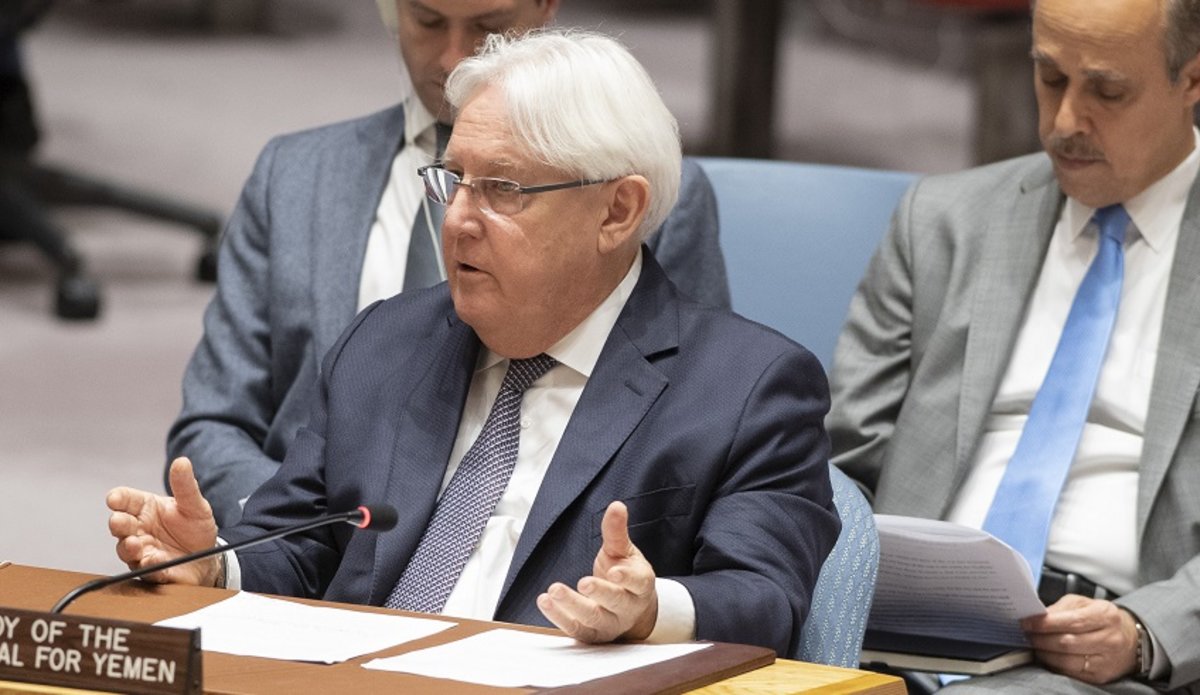Special Envoy briefs the Security Council and announces consultations in September in Geneva
Madam President, Members of this Council,
We meet at an important time. It has been two years – two years - too long since the Yemeni people had the chance for a negotiated end to this war.
Today, therefore, as we meet we have the chance to weigh the opportunities for peace. And I hope to begin the difficult and uncertain journey away from war.
Earlier this week, Madam President, I had the privilege to meet with a man who has lived the mission of peace and of reconciliation. I am referring to His Highness the Emir of Kuwait. I cannot easily remember someone who has so successfully confronted the challenge of war and then of peace, which succeeded, and he has so clearly shown us how to move from one to the other and he speaks so movingly of the process in which his country was rescued including by coalition and then formed a constructive relationship with Iraq
Madam President,
Recently and despite all our efforts the pace of war has increased. We meet at a time when the focus of the war is the battle for Hodeida. And what military people tell me about Hodeida is that it has become the centre of gravity of the war. The Red Sea now is also a theater of war.
We have tried to find a way to avoid a battle for the city and the port of Hodeida. We are still trying. But even though the requirements for such a deal, for such arrangement are not yet met it is to be noted that our efforts with your unified support have managed to narrow the gap between the two sides in a way that nobody expected.
What is clear to me now, Madam President, is that this issue – the resolution of the specific crisis in Hodeidah - has a better chance of being resolved within the context of a comprehensive political settlement.
What does this mean for us today?
It means that it is time long past for us, together, to call for an early resumption of the political process, two years since the last round in Kuwait. My principal message and request to this Council today is that we urge the parties to resolve this conflict through negotiation rather than through military means. A sentiment that members of this Council have consistently expressed.
After having consulted with the parties, I plan therefore to invite them to Geneva on September 6th for a first round of consultations. These consultations will provide the opportunity for the parties, among other things, to discuss the framework for negotiations, to agree on relevant confidence-building measures and specific plans for moving the process forward. I ask for the Council’s support in this.
In this connection, our engagements with women’s group as well as the southern stakeholders are crucial for the success of future consultations. and as it is set out in Security Council Resolution 2216, I would aim for an as inclusive process as possible.
I did not come lightly to this decision. I have based this on the advice given to me in the months since assuming my responsibilities by Yemenis from all quarters. I have engaged with the parties of course primarily but also with civil society. I am especially grateful for my meetings with Yemeni women as I continue to consult with them on elements of the peace process. Their voices unsurprisingly and consistently remind us that Yemeni families bear the brunt of this conflict, and want it done with.
I know, from this engagement, that a political solution to this war, in line with the relevant resolutions of this Council, the GCC initiative and the National Dialogue Outcome, is available, as I have said before to this council. Believe me, Madam President, we know what can work. We have heard it from all sides, we have talked to all of them. We have studied the experience of past efforts to resolve this conflict, and one hundred days in Kuwait as the Emir was reminding me the other day is an enormously valuable guide for us.
Madam President,
An end to this war cannot come too soon for the people of Yemen. As our humanitarian colleagues are quick to remind us, and am sure John will do so, if we don’t succeed together to put an end to it, there will be millions more Yemenis depending on the assistance of our humanitarian agencies. I am very conscious as we all are that each day costs lives which we might have saved, that people could have been alive, who are not today, had we acted earlier.
Let me speak for a moment about what is happening in Yemen.
On Hodeidah, as already mentioned, we have made progress particularly as regards to a United Nations role in the port, which was agreed with me by the leadership of Ansar Allah some weeks ago. But it does not mean that the gap is closed, the gap is not closed. We will continue our efforts to find a peaceful solution there. This progress is due to the serious cooperation I have received from all sides and this Council’s active support. I continue to enjoy close cooperation and support from the Government of Yemen and their leadership, always an important engaging primary partner as well as the Coalition leadership. I also had a series of constructive and positive meetings with the senior leadership of Ansar Allah. These relationships are absolutely key to any potential success we may expect in this endeavor of a political settlement. The nurturing of relationships is a primary task for somebody in my position
Let us not throw away what we have achieved on Hodeida therefore. I am determined to build on it in our consultations. But let us not allow, - as I have been reminded today- let us not allow progress or the absence of it on Hodeida deter us from our primary focus, which is on the search for a political solution to this conflict.
I am concerned that Hodeidah could be a flashpoint. I take seriously any offer of de-escalation, regardless of its magnitude, including the unilateral offer from Ansar Allah to stop all attacks on shipping. Many of us would not have wanted these attacks to have happened at all. My concern is to avoid any action with dire humanitarian consequences and nor those, which may undermine the resumption of the political process in September. I call on the parties, with the support of this Council, to create a conducive environment, and I use these words carefully, conducive environment to allow for this to happen.
On other matters, I am greatly encouraged by the common desire of the parties to have the many many thousands of prisoners of war released. My office has been hard at work on this. And this was an issue that President Hadi, on each occasion I had met him has particularly urged us to take the lead on and I think this is a tribute to his humanity. And I know we all want to see this moving forward as fast as we can.
Madam President,
Let me conclude by summing up my requests to you and your members.
Firstly, support for my effort to begin consultations in September in Geneva.
Secondly, support for de-escalation in Hodeida. And to keep the Red Sea out of the conflict.
Thirdly, support for those measures I mentioned one, release of prisoners, there are many others, that bring hope back to the people of Yemen. It is the people of Yemen who will ensure that we have a good chance to make those political negotiations work. Without their involvement, interest, advocacy and support we will not make it. They need encouragement to believe that this can happen
Fourthly, please join me as I know you will, in recognizing the extraordinary courage of international humanitarian organisations which I have had the privilege in my frequent visits to Yemen of witnessing first hand their courage, their diligence, their reliability, their independence and impartiality. It is an exceptional privilege to all of us to be colleagues.
Finally, through you Madame I would like to thank this Council for the extraordinary level of support that you have provided to my efforts. It makes an enormous difference to have a united and eloquent Council asserting the principles of the United Nations. Your continued unity is by any standards the key to the resolution of this conflict.
Thank you, Madam President.
 UN
UN







